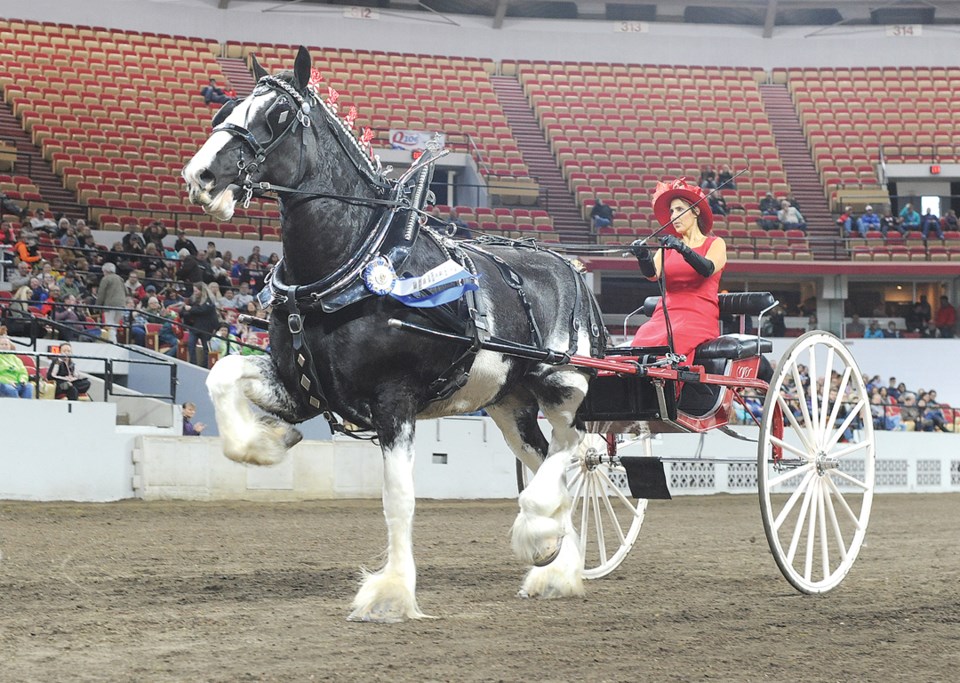Linda Banga is among the best drivers in the Clydesdale world, as a trio of championships from the recent World Clydesdale Show in Madison, WI. attest.
“I almost didn’t go. I was thinking we had so much harvest left. It was just awful,” said the Canora area Clydesdale owner.
But her husband Darcy Korol convinced her to go, reminding her of all the work she had already put into preparing her horses.
But it still wasn’t easy.
“I was crying when I left,” she admitted, adding it was a big step to be heading out on her own for a show as far away as Wisconsin.
Banga took two horses south.
“I normally show four in the summer,” she said. But, with harvest and teaching full-time she didn’t feel she had the time to properly prepare four animals for a world calibre show.
At the World Show Banga showed both her mares in halter classes first, capturing a sixth and a third, finishes she was satisfied with.
“There were some really good halter mares there,” she said, adding in the United States a lot of people show horses exclusively in halter classes, having other horses for hitch classes. That, she said, is an advantage because being in harness pulling wagons can cause wear on a horses coat, an issue in a close halter class.
By contrast, in Canada, most animals do both, including Banga’s mares, which would go on to shine in harness in Wisconsin.
Still, going into the driving classes Banga was uncertain how her horses would respond to showing inside.
“They had never shown in an arena,” she said, adding there are different distractions for the horses to deal with.
The worry proved to be for naught.
“They liked it,” said Banga.
Reba is Banga’s cart horse. She is a mare with a lot of fire, so she is used in multiple classes, taking them in stride.
In the Registered Mare Cart class Banga said she went in to the class with a modest goal in mind.
“I was hoping for top-10,” she said, adding she was keenly aware it was the toughest cart class she had ever been in. There were 44 competitors in the class.
In the ring Banga did realize things had gone well for her and Reba.
“After the drive I was hoping for top-three because she drove really well,” she said.
In the end she earned the World Championship in the class.
“I never dreamed I could win,” she said, noting in the U.S. top mares are selling for $50, $60, $70,000. “It’s getting so competitive and so expensive.”
It was a win Banga admitted initially she probably didn’t appreciate as much as others.
“As I came out of the ring some guys from Manitoba I show against were crying,” she said. “I don’t think I realized how big it was.”
Later she would be runner-up in the Cart Bred and Owned Class.
Banga would also capture the championship in the ladies driver class, driving Reba.
“There were some really good horses in that. It was really tough class, but they drove excellent,” she said, noting there were 57 entries.
A third championship came in Ladies Team, which was open to mares, stallions or geldings. Banga said that is a tough class for mares as stallions and geldings are just naturally stronger. Facing 38 competitors she came out on top.
Home from the event with her championships in tow, Banga said naturally she is glad she decided to go.
“I am now,” she said, but quickly added it was still not easy leaving her husband to harvest, and her eight old son Ty, who almost always goes to shows, behind because there was no one to keep an eye on him in Wisconsin.
“It was long days, up at four in the morning and working until 11 at night,” she said.
But that is what is required at a show attracting horses from across the United States and Canada to compete in more than 100 classes.
Banga said the entire event was pressure packed with three judges scoring every driving class.
“You could not make a mistake, they would see you,” she said, adding with a single judge small miscues can go unnoticed. “They stood on every corner. You had to be perfect. That was a challenge. You couldn’t make a mistake. They had to be perfect drives.”
So what was the secret for Banga’s success on the world stage?
“Lots of driving at home,” she said.
And, then attention to the details to improve things, said Banga. She said her husband would take time from combining the crop to video tape her practice drives so she could review and make adjustments.
Familiarity helps too.
“Training your own colts (helps) because a colt challenges you,” said Banga. “I train my own horses and when you’re working with colts you are constantly adjusting your driving to get the colt to respond.
“Probably the most important thing when working with horses is to figure out what makes the horse happy!
“When I am driving a horse as soon as it’s not enjoying its job I stop and adjust the harness or bridle and figure out how to make it comfortable. They have to love their job. If they don’t love driving there is no point forcing them to do it.
“I have also learned to appreciate where the horse is at. For example, Fancy does not have the stamina to drive everyday whereas Reba has to drive every day or she starts misbehaving. So I drive Fancy every third day and Reba every day.”



